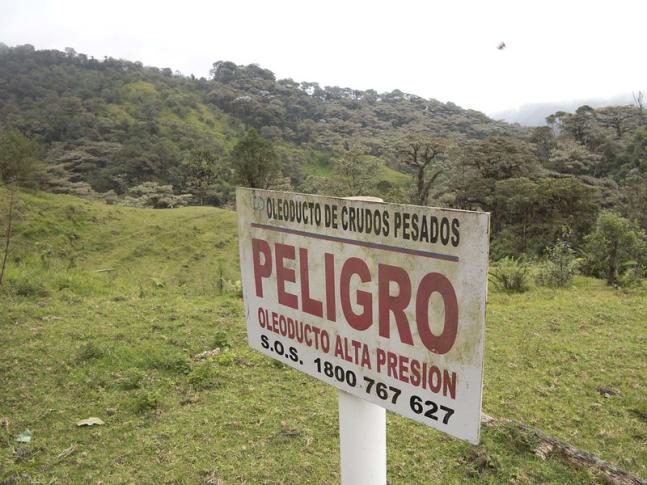
This piece is based on a Lightning Talk titled "Digital capitalism, climate justice and territories" at the 2024 APC Community Gathering.
When we talk about violence, especially in the countries of the global South, we often think of organised crime, mafias or insecurity. However, this ignores the other forms of violence that exist, not only in the South, but in the entire world.
We can affirm that these other forms of violence in Latin America and the Caribbean have been present since the time of invasion, conquest and occupation by colonial empires. Violence that continues with neo-colonial processes of extractivism, free trade, indebtedness, and today, the green economy. All of this is compounded by climate crises, whose main victims, the peoples of the global South, did not cause them.
Governments collude with transnational corporations to allow impunity for their actions, as well as repression of those who defend human rights and the rights of nature.
Is the pollution of water, soil and air in areas where fossil hydrocarbons are extracted –primarily for export to the global North, including China – not violence? Or the minerals extracted for the falsely named “transition” in the global North?
Is the demand for payment of an odious and illegitimate financial debt not an act of extreme violence, one which forces the countries of the South to allocate huge amounts of money to service usurious interest charges, neglecting social spending and environmental care?
Does free trade, with its rules created to favour the interests of transnational corporations, not generate violence on the lands and territories of displaced and impoverished rural communities, or on the soils and rivers designated to guarantee agro-exports to the United States, Europe or China?
With climate crises, new threats and violence arise – in this case, due to climate disasters, which are not natural, and on the other hand, due to the false solutions to global warming within a framework of “green” capitalism.
Zero-carbon or carbon-neutral programmes based on carbon offsets, so-called nature-based solutions (or should we call them solutions that instrumentalise nature?), provoke violations of human rights and the rights of nature.
These imposed policies are carried out whether the governments involved are right-wing, progressive or left-wing. For more than 30 years, all states have been promoting this type of false solutions to climate crises at the national or international level, mainly from the United Nations, supported by the financial system and corporate sectors.
Recently, with the advent of the Paris Agreement and the digitalisation of the economy, carbon offsetting schemes have proliferated without limit. This is despite constant warnings that they do not combat climate change and, on the contrary, make it worse because they constitute a licence to pollute, permit double counting of carbon offsets, and are linked to ever-increasing illicit business, fraud and scams.
At the same time, plans for the massive deployment of renewable energy technologies such as biomass, solar and wind energy are leading to increased dispossession and land grabbing in the South, causing rights violations that are even more problematic when associated with carbon offset certificates. This is new violence unleashed by the “green” economy.
As if that were not enough, plans related to geoengineering, manipulation of the climate, solar radiation, the carbon cycle, or other plans that circumvent science, are being pursued on a large scale, which could cause irreversible damage to the stability of the planet.
All these plans seek only to maintain fossil-dependent capitalism, unsustainable forms of production and consumption, and to try to overcome the crisis of capital accumulation caused by its own social and ecological impacts.
However, despite this scenario, there are real initiatives for measurable, concrete and effective solutions to climate change, such as preventing the expansion of mining, the protection of forests by Indigenous peoples, or the decision taken by Ecuadorians on 20 August 2023 to stop extracting oil from the Yasuní National Park.
Today, with the rise of the digital economy, the possibility of fraud linked to the carbon market is increasing due to a lack of monitoring, the ease of creating digital assets without control, and the increased approach to local communities with million-dollar offers, in the face of which vulnerable organisations enter the carbon offset business without knowing the origin of the resources or the destination of the carbon credits.
APC has the challenge, and the mandate, to deepen the debate about the role of the digitalisation of societies and the economy on human, environmental and natural rights. APC must also move towards promoting greater awareness that digital technologies and digitalisation do not necessarily imply a dematerialisation of production processes; on the contrary, it may be that more energy and more materials are being used for these processes along the way. It is also essential to stress that carbon-neutral or zero-carbon proposals, as well as corporate and large-scale so-called renewable energies, cannot be part of the proposals for the democratisation and expansion of access to the internet.
Finally, we must ensure that new information and communications technologies that are in favour of and under the control of the people do not reproduce the spiral of destruction, but rather, on the contrary, move towards the depetrolisation of societies and emancipate the planet from fossil fuel dependency.
Image: Site of Trans-Ecuadorian System Oil Pipeline (SOTE), Mid-elevation Cloud Forest, Western Slope of Andes, Ecuador by GRID-Arendal (CC BY-NC-SA 2.0) www.grida.no/resources/3778
Ivonne Yanez is an Ecuadorian environmentalist and co-founder of Acción Ecologica. She has been working on climate change for almost 20 years and more recently on environmental services and green economy. She is a feminist grandmother who likes science fiction and time travel.